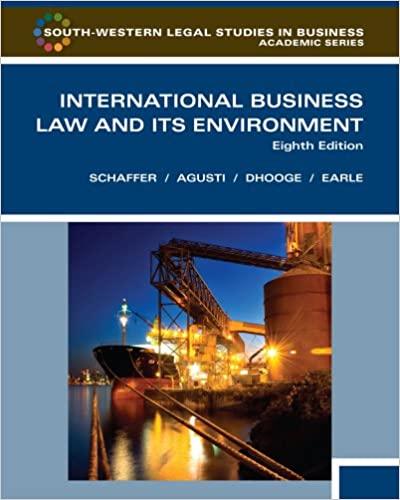Question
JM (Tenant) applied for an Order that the Landlord ABC Inc. (Landlord) interfered with the reasonable enjoyment of the rental unit or residential complex by
JM (Tenant) applied for an Order that the Landlord ABC Inc. (Landlord) interfered with the reasonable enjoyment of the rental unit or residential complex by the Tenant or by a member of the Tenant's household.
This case is regarding a second parking spot in the visitor's parking lot, which was not available for the tenant's use throughout the tenancy.
8 months ago (count from today), the tenant and his two daughters viewed the 2-bedroom condominium apartment, located at 1 Bay Street, Toronto, Ontario, M9Y 3H4. The tenant asked the landlord if there was parking for two vehicles and the landlord confirmed that one vehicle can be parked underground and the other on the main floor in visitor parking for up to 3 days. He added "it's free for everyone". The tenant's daughters Kitty and Katie were both present during this conversation.
The landlord understood that two parking spots were very important to the tenant.
The tenant contact the landlord the next day and requested for the lease agreement. After reading the lease, he noticed that the second parking spot was not mentioned.
The landlord responded back the same day via e-mail with the following message:
"I will assign you spot 23 underground. You can park in the visitor parking but make sure you get permission from us."
The tenant responded back via e-mail:
"Hi, I accept the lease agreement."
The lease was signed 8 months ago (from the current date). It is binding for 12-months; monthly rent is $1,500.00. Based on 8 months from today, fill in the date the Lease was signed:.
The landlord e-mailed the tenant the next day, after the lease agreement was signed to advise him of the following:
"Hi, I am just letting you know, because I just found out. The board changed the rules TODAY regarding parking. You can park in your spot, the one I assigned to you - okay. Here is whatthe new rules say. If you want to park in the visitor parking for your other car, you have to pay $50.00, or park on the street - you know beside that convenience store. I think you should look into finding another person who can rent to you, that's okay too. Let us know. Have a good day."
The tenant is angry and frustrated. He placed his name on the waiting list for parking. For now, he has decided to park on the street beside the convenience store. This option was provided on the landlord's e-mail.
One month from the date the lease was signed, the tenant e-mailed the landlord asking about the waiting list for the parking. He states that he only has one more day to park on the street, then the city will issue him a ticket.
The Landlord replied the same date and said:
"Hi, can't help you out. You can always cancel your lease as of next month. I will advertise your unit, and you can move out when I find another tenant."
By the seventh month (count from the date the lease was signed), the tenant had obtained 17 tickets for parking on the street. He e-mailed the landlord the following:
"I have received 17 tickets. I paid $1,500.00 for the tickets. I remind you, when I first came to rent the apartment, you told me I can park underground and in visitors. One day after signing the lease, you changed the rules. I will be vacating the unit next month."
The landlord responded back with the following e-mail:
"I understand, I tried to help you. We are going to start advertising the unit. For now, you can park in the visitor parking, with a visitor tag."
The tenant parked in the visitor parking with a visitor's tag as per the landlord's e-mail. He was still ticketed. The tenant informed the management regarding the tickets he received however was informed not to complain. He was informed by management that he was not allowed to park in visitor's parking, because he was a resident. He has paid a total of $500.00 for the tickets he received in visitor's parking during the seventh month of his lease. He wrote to the landlord letting him know this and the landlord responded back the same day stating:
"I understand. The management is poor. The rules constantly change."
The tenant moved out the following month, on the eighth month of his lease.
provided facts, issues, and damages. apply critical thinking, knowledge and attention to detail in order to identify the items, count days and figure out calculations.
Step by Step Solution
There are 3 Steps involved in it
Step: 1

Get Instant Access to Expert-Tailored Solutions
See step-by-step solutions with expert insights and AI powered tools for academic success
Step: 2

Step: 3

Ace Your Homework with AI
Get the answers you need in no time with our AI-driven, step-by-step assistance
Get Started


